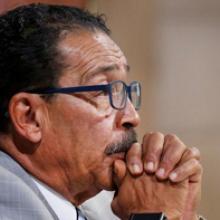The Los Angeles City Council took the final step Tuesday toward putting what has become an increasingly controversial measure on the May ballot that, if passed by voters, could give civilians a greater role in disciplining the city's police officers.
The council's unanimous approval of the ballot measure's language came shortly after lawmakers agreed to conduct a deeper analysis of the LAPD's complicated, often-criticized disciplinary system and to hold public meetings on the issue.
City Council President Herb Wesson, who introduced both the ballot measure and the proposal for a broader review of discipline, said he hoped Tuesday would mark the start of a "very serious conversation" about not only the disciplinary system but the relationship between police and the public.
"That relationship needs to get better," he told reporters after the vote. "I hope that this is the beginning of something really big."
Voters will now be asked in May whether the City Charter should be amended so LAPD officers facing serious discipline could have their cases heard by an all-civilian panel. Under the current system, the disciplinary hearings - known formally as Board of Rights panels - are made up of two high-ranking officers and only one civilian.
Offering all-civilian boards would mark perhaps the most significant change to the LAPD's disciplinary system in decades - one that has long been sought by the union representing some 9,800 rank-and-file officers.
But talk of the ballot measure, which was supported by Mayor Eric Garcetti, drew criticism from several community groups and LAPD observers. Although they welcomed a top-to-bottom examination - and larger overhaul - of the disciplinary system, many consider simply adding more civilians to the panels the wrong approach.
Four groups - the Community Coalition, the American Civil Liberties Union, Los Angeles Community Action Network and the L.A. branch of the Black Lives Matter movement - have led the opposition and voiced concerns again just minutes before Tuesday's vote.
The coalition argued that the qualification requirements for the civilians who sit on the disciplinary boards unfairly exclude the vast majority of Angelenos. To be eligible to sit on a panel, a civilian must have spent seven years as a professional mediator or arbitrator, or have similar experience in another job, such as human relations.
Some opponents of the ballot measure accused the union of looking for softer punishments for officers, pointing to a city analysis that showed that civilian members were "consistently more lenient" than their sworn counterparts and frequently voted to acquit officers or dole out lesser punishments.
They urged council members to hold off on the ballot measure until the public could be consulted about broader changes to the disciplinary process. Representatives from Black Lives Matter and the Community Action Network said their groups warned lawmakers that they would not support the measure.
"Take your time. Listen to us. Don't do this now," said Greg Akili, a longtime activist and member of Black Lives Matter.
Karren Lane, vice president of policy for the Community Coalition, said after Tuesday's vote that she believed the planned public discussions about the disciplinary process would lead to a "more fruitful outcome that truly achieves justice and transparency." She said in a statement that she hoped the council "has the political will" to implement reforms suggested by the public.
LAPD Chief Charlie Beck has also expressed reservations about removing sworn officers from the disciplinary panels. In a statement issued Tuesday, a department spokesman said Beck "fully supports the council's community-based efforts to reform an antiquated disciplinary system."
The current system "has taken disciplinary decisions out of the hands of the chief of police for many years, and improvements to ensure fairness, consistency, transparency and appropriate checks and balances are long overdue," spokesman Josh Rubenstein said.
Under the current system, Beck must send any officer he wants to fire to a Board of Rights hearing. If the panel determines the officer is guilty of the accusations, it then recommends whether to fire the officer or assign a lesser penalty, such as a suspension. The chief can accept or reduce the punishment but not increase its severity.
Officials with the police union contend that the boards can be unfairly swayed by favoritism within the department - or by the chief's influence over the two officers who sit on each panel. Civilians can look at the cases more objectively, they argue, without pressure from the police chief.
"Those that are attacking this ballot measure are actually attacking additional participation by the residents of Los Angeles in how their police department is run, and that's unfortunate," said the union's president, Craig Lally, in a statement after Tuesday's vote.
The community meetings, Lally added, will allow the public "to see just how extensive and robust the current civilian oversight of the department is and how this ballot measure will expand that civilian oversight."
Wesson acknowledged the concerns during his remarks on the council floor but reaffirmed his support of what he described as "citizen participation" in policing. If leniency from civilians on the disciplinary panels is a concern, he said, then it's time to reevaluate how those civilians are selected. But the ballot measure, he said, offers the first step toward change.
"I believe that once we open this door, it will be easier for us to open it again and again if we want to make additional changes," he said. "Is this perfect? No. Is it flawed? Yes. But I do believe that it's a step in the right direction."











